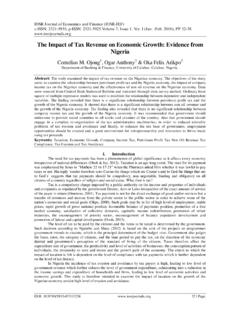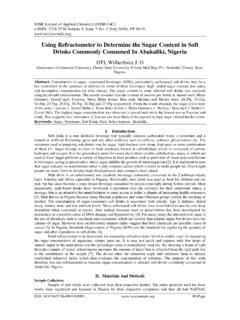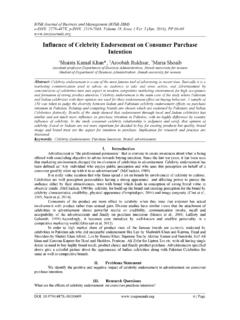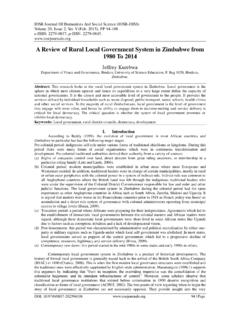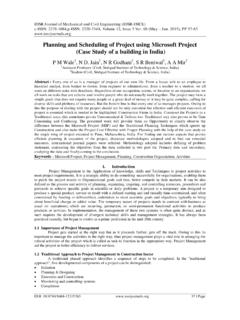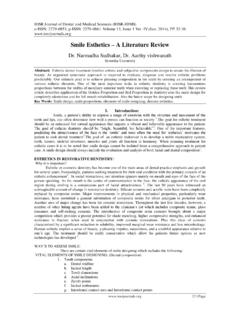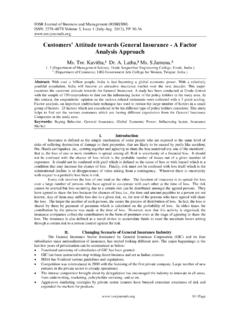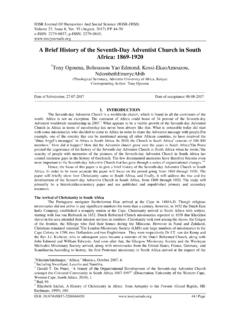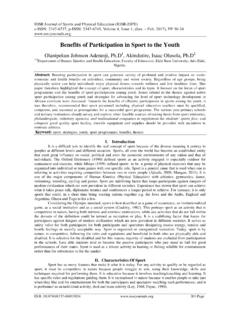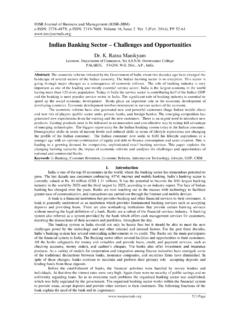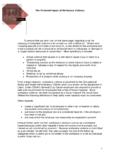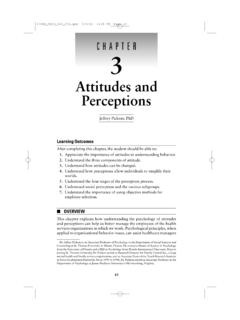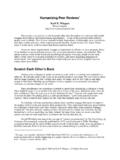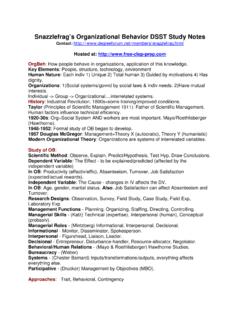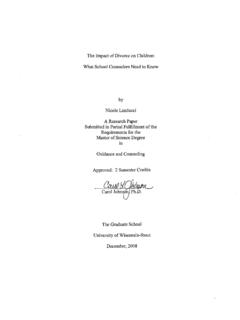Transcription of Effect of Management Control to Organizational …
1 IOSR Journal of Business and Management (IOSR-JBM) e-ISSN: 8, Issue 4 (Mar. - Apr. 2013), PP 40-52 40 | Page Effect of Management Control to Organizational culture , Compensation, work behavior and Employees Performance. (Studies in the Village Unit Cooperatives (KUD) in Southeast Sulawesi) Nurwati FakultasEkonomiUniversitasHaluoleoKendar i Jalan HEA. Mokodompit Kendari Sultra Indonesia Abstract: Cooperative as a business organization or company that is managed on the basis of principle of the family, must adhere to the principles of sound Management , transparent, accountable, and to be fair in the achievement of common goals.
2 Executives / managers and employees of cooperatives should be responsible in the use of cooperative economic resources efficiently to sustain profit efforts in this is therefore necessary to Control Management role in carrying out the work culture generate employment, foster an atmosphere of cooperation, and can influence the behavior of subordinates that will have an impact on improving employee performance. Besides, it also required that promote employee professional and cooperative study aims to identify and assess the relevance of Management Control on employee performance by considering the Organizational culture , compensation, and work behavior as determinants of employee performance improvement.
3 This study sampled 135 employees at 18 Village Unit Cooperatives se Sulawesi Tenggara. Data collection is done by distributing questionnaires followed by in-depth interviews (in-depth). This study used descriptive analysis to determine the characteristics of the respondent and respondent description of indicators each study variable. While to examine the pattern of relationships between the study variables used inferential analysis tool that analyzes point to the approach of SPSS version 20. The results of this study indicate that adequate Management controls to improve employee performance when attention to the factors that contributed to the culture of the organization, compensation and workplace behavior on cooperatives in the province of Southeast Sulawesi.
4 The study also produced findings to improve employee behavior for the better when the culture of the organization and compensation factors considered. Keywords: Management Control , Organizational culture , compensation, workplace behavior and employee performance. I. Introduction The Control function (controlling) role is to detect potential weaknesses that occur as a feedback to the Management of an activity, starting from the planning stage to the implementation stage. Matters covered by the controlling function includes the creation of standards or criteria, comparing results with standardmonitoring, the implementation of an improvement over the deviation or aberration, modification and adjustment of the Control method, and Control glasses result of changing conditions, as well as communicating the revisions and adjustments to the entire process Management in the hope of irregularities or flaws that ever happened does not happen again.
5 Management Control aims to ascertain whether the tasks and functions of supervision and objects or activities in accordance with established (Sitorus at al., 2007). Management Control is the process of influencing others in a company in order to effectively and efficient for achieve the goals. Determination of corporate objectives and strategies to achieve them done in a process called strategic planning. Since strategic planning can not be separated from the environment, the strategic planning can also be regarded as a reaction to the environment Control is a tool to monitor or observe the implementation of the Management company that tried to steer the achievement of more efficient and effective (Anthony et al.)
6 , 2000). A reliable employees and administrators, capable and competent to complete a variety of duties and functions entrusted to capacity is a likely take place if the cooperative is managed and implemented by the board that can be the inspiration that can encourage Organizational culture and work behavior , so as to improve the performance of the employee as a result of work accomplished in relation to its position within the organization. Improved employee performance, through the achievement of goals and objectives, both to improve services to members and improve the ability of cooperatives to obtain windfall profits, the cooperative as an economic institution needs to improve its competitiveness, in order to conduct business is always based on the efficiency and effectiveness of business.
7 The best way to conduct business that Effect of Management Control to Organizational culture , Compensation, work behavior and 41 | Page is based on the elements of the efficiency and effectiveness of the business is through the implementation of good Management Control . culture is able to help a person or group of people to interact and communicate with others in the community (Gibson, 1996). The same is happening in the organization (Babin et al., 1998), every organization has a culture , and depending on the behavior .
8 culture can be a powerful influence on the attitudes and behavior of the members of the organization at the Organizational level, culture is a set of assumptions beliefs, values and perceptions that of the members of the group (Hofstede, 1980; Schein, 1996; Sachman, 1992; Meschi and Roger, 1995). Susanto (1997) states as Organizational culture values the grip of human resources in performing its obligations affecting the behavior of individuals within the organization. However the high level of complexity of individual behavior and group or Organizational behavior , should be managed, because in the end the work of the organization is achieved through people, either individually or collectively, either by himself or with the help of technology.
9 Therefore, the Management of Organizational behavior has a central position in the organization due to some issues related to the goals of Organizational behavior itself. The amount of employee performance, employee performance appraisal needs to be done which is very important for achieving Organizational performance. The purpose is to evaluate the performance as well as to train and develop employees being assessed. Because so many benefits for the employee performance appraisal and concerns the life of an employee, the performance appraisal system should be able to be an effective instrument and on target, Blau (1999), Miller (2001) in Siahaan (2007) The performance is the level of achievement for the implementation of a specific task (Wibowo, 2010).
10 Employee performance as the end of an employee's performance and contain several things, such as the specific targets are achieved, have a term in the achievement and realization of efficiency and effectiveness culture is able to help a person or group of people to interact and communicate with others in the community (Gibson, 1996). The same is happening in the organization (Babin et al., 1998), because every organization has a culture , and depending on the strength. culture can be a powerful influence on the attitudes and behavior of the members of the organization at the Organizational level, culture is a set of assumptions beliefs, values and perceptions that of the members of the group (Hofstede, 1980; Schein, 1996; Sachman, 1992; Meschi and Roger, 1995).
